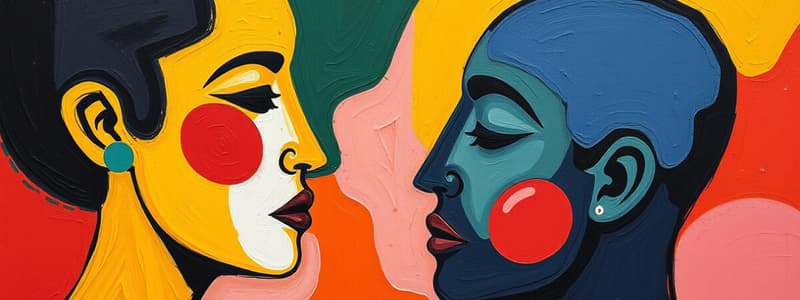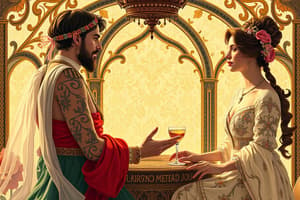Podcast
Questions and Answers
What does Role Learning Theory suggest about identity formation?
What does Role Learning Theory suggest about identity formation?
- All roles are innate and not influenced by culture.
- Identity is static and unchanged by society.
- Identity is solely shaped by individual experiences.
- We learn to play roles based on societal expectations. (correct)
Which term refers to moral rules that govern behavior?
Which term refers to moral rules that govern behavior?
- Laws
- Taboos
- Mores (correct)
- Folkways
What is an example of enculturation?
What is an example of enculturation?
- Participating in educational programs.
- Reading books on societal norms.
- Learning to drive from friends.
- Adopting a cultural practice from family and community. (correct)
What is the concept of role conflict?
What is the concept of role conflict?
What best describes social control?
What best describes social control?
Which of the following is an example of deviance?
Which of the following is an example of deviance?
What role does social media play in identity formation today?
What role does social media play in identity formation today?
Which term is used for behaviors that are considered extremely unacceptable?
Which term is used for behaviors that are considered extremely unacceptable?
What does individuation primarily involve?
What does individuation primarily involve?
How does social identity influence behavior?
How does social identity influence behavior?
Which identity is most likely to be described as a person's core self?
Which identity is most likely to be described as a person's core self?
What does symbolic interactionism emphasize in identity formation?
What does symbolic interactionism emphasize in identity formation?
What cultural value is emphasized in Scandinavian countries?
What cultural value is emphasized in Scandinavian countries?
Which example best illustrates the concept of 'Doing Me'?
Which example best illustrates the concept of 'Doing Me'?
How might folkways differ from more stringent cultural norms?
How might folkways differ from more stringent cultural norms?
What is a primary focus of role learning theory in identity development?
What is a primary focus of role learning theory in identity development?
What does enculturation primarily involve?
What does enculturation primarily involve?
What is an example of a moral imperative in many societies?
What is an example of a moral imperative in many societies?
Which of the following best describes socialization?
Which of the following best describes socialization?
Which action exemplifies a strict cultural taboo?
Which action exemplifies a strict cultural taboo?
How can identity formation be described?
How can identity formation be described?
What is the core part of one's identity known as?
What is the core part of one's identity known as?
What could happen if someone breaks traffic laws?
What could happen if someone breaks traffic laws?
How does social identity differ from personal identity?
How does social identity differ from personal identity?
What does role conflict refer to?
What does role conflict refer to?
Which statement about feral children like Genie is true?
Which statement about feral children like Genie is true?
What is an example of role strain?
What is an example of role strain?
What does deviance refer to in social terms?
What does deviance refer to in social terms?
Why are identities considered socially constructed?
Why are identities considered socially constructed?
What is an example of a positive sanction?
What is an example of a positive sanction?
Which aspect of identity is described as 'Doing Me'?
Which aspect of identity is described as 'Doing Me'?
What might a person experience after being labeled a thief?
What might a person experience after being labeled a thief?
Study Notes
Enculturation
- Refers to the process of learning the cultural norms, language, customs, and values of the culture one is born into.
- An example includes a child in an environment where basketball is favored, likely developing a similar interest due to cultural influence.
Socialization
- Society's mechanism to impart expectations on behavior, like politeness and respect for elders.
- The case of Genie illustrates extreme socialization deprivation, adversely affecting her ability to adjust to societal norms upon discovery.
Identity Formation
- Identity is shaped by enculturation and socialization influencing beliefs, values, and behaviors.
- Individuation involves developing a unique identity despite social influences, such as pursuing a personal passion against family expectations.
- Personal identity is derived from unique experiences and self-perception within the societal context.
- Social identity focuses on how one identifies with various groups, influenced by societal roles and expectations.
Four Parts of Human Identity
- Existential "I": The core self, indicating intrinsic values and self-worth.
- Doing "Me": Daily actions that reflect personal identity, such as a doctor’s or teacher’s role.
- Cultural "I": The impact of cultural norms on one's identity, like social behaviors in different cultural contexts.
- Performing "Me": Role behavior variations depending on context, such as an actor’s performance compared to everyday life.
Theories of Identity
- Role Learning Theory explains identity development through societal role expectations.
- Symbolic Interactionism emphasizes the role of social interactions in forming identity, as experiences shape self-perception and behavior.
Norms and Values
- Cultural values guide behavioral standards within a society, like the Scandinavian emphasis on work-life balance.
- Norms dictate acceptable behaviors, such as everyday customs and serious moral rules (mores).
- Taboos are strongly forbidden actions, while laws are established legal frameworks with consequences for violations.
Status and Roles
- Status determines a person's societal position, like being respected as a doctor.
- Role conflict arises when multiple roles compete for attention, such as balancing work and parenting.
- Role strain occurs when fulfilling a specific role becomes challenging, as seen in a student-athlete’s struggles.
- Role exit describes the process of leaving a social role for another, like transitioning from employee to entrepreneur.
Conformity and Deviance
- Conformity involves adhering to societal rules and expectations, such as dress codes in schools.
- Deviance refers to actions against societal norms, like civil disobedience.
- Stigma denotes society's negative labels attached to individuals who engage in deviant behavior.
Social Control
- Social control mechanisms involve regulating behavior to maintain societal order via sanctions.
- Formal sanctions can include official punishments, while informal sanctions are societal cues, such as disapproving looks.
- Positive sanctions reward conformity, promoting desirable behaviors in social settings.
Conclusion
- Identity is formed through the intertwined processes of enculturation and socialization, influenced heavily by traditional influences and increasingly by social media.
Studying That Suits You
Use AI to generate personalized quizzes and flashcards to suit your learning preferences.
Related Documents
Description
This quiz explores the concepts of enculturation, socialization, and identity formation. Understand how cultural norms and societal expectations shape individual identity through various examples and situations. Test your knowledge on these essential sociological processes!


